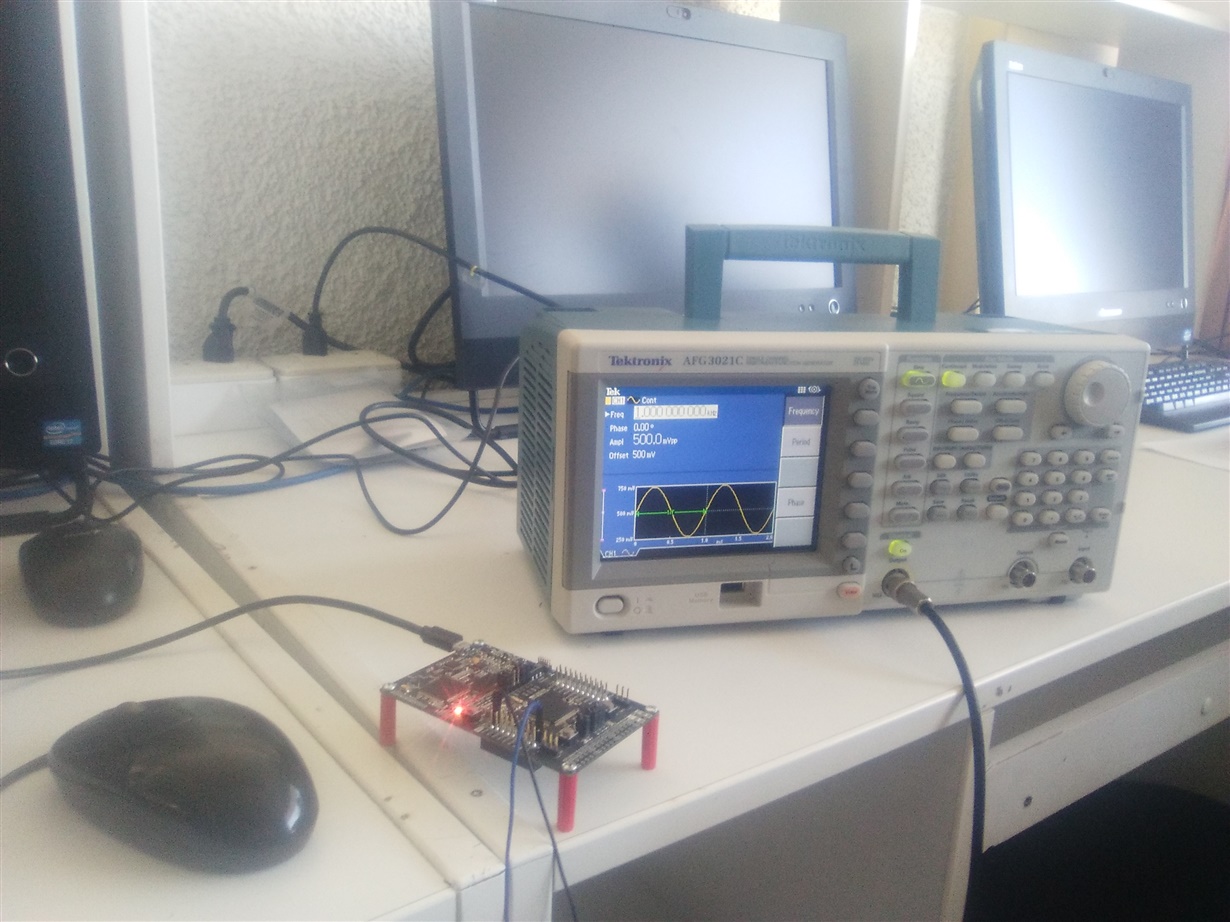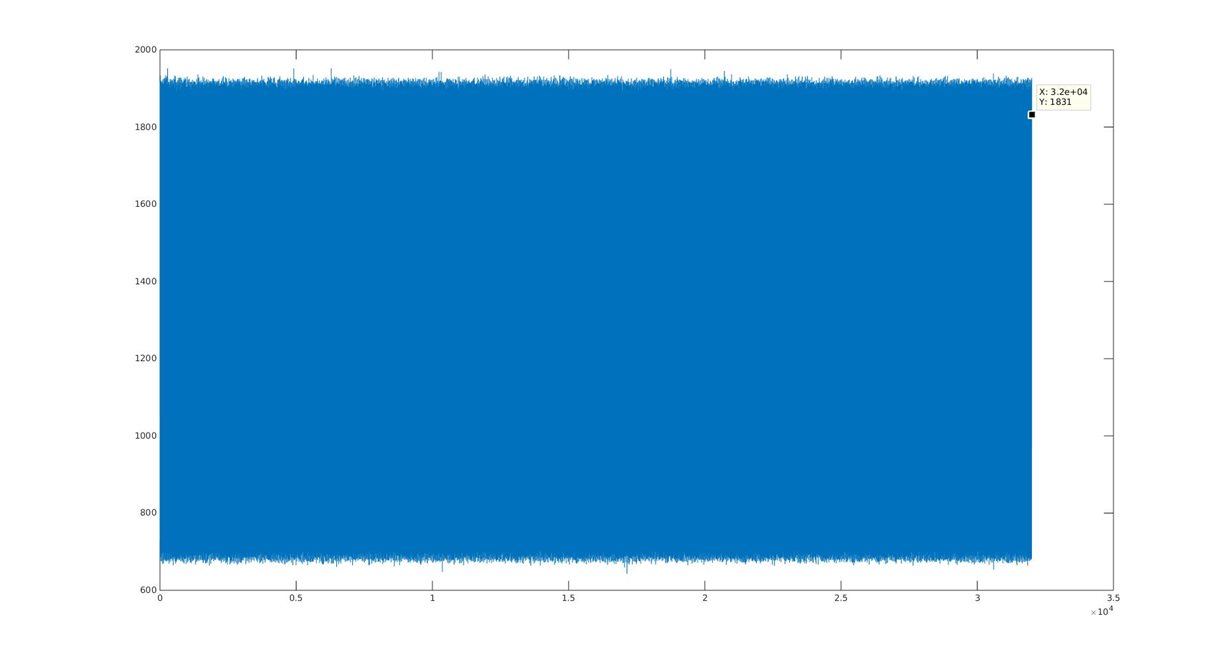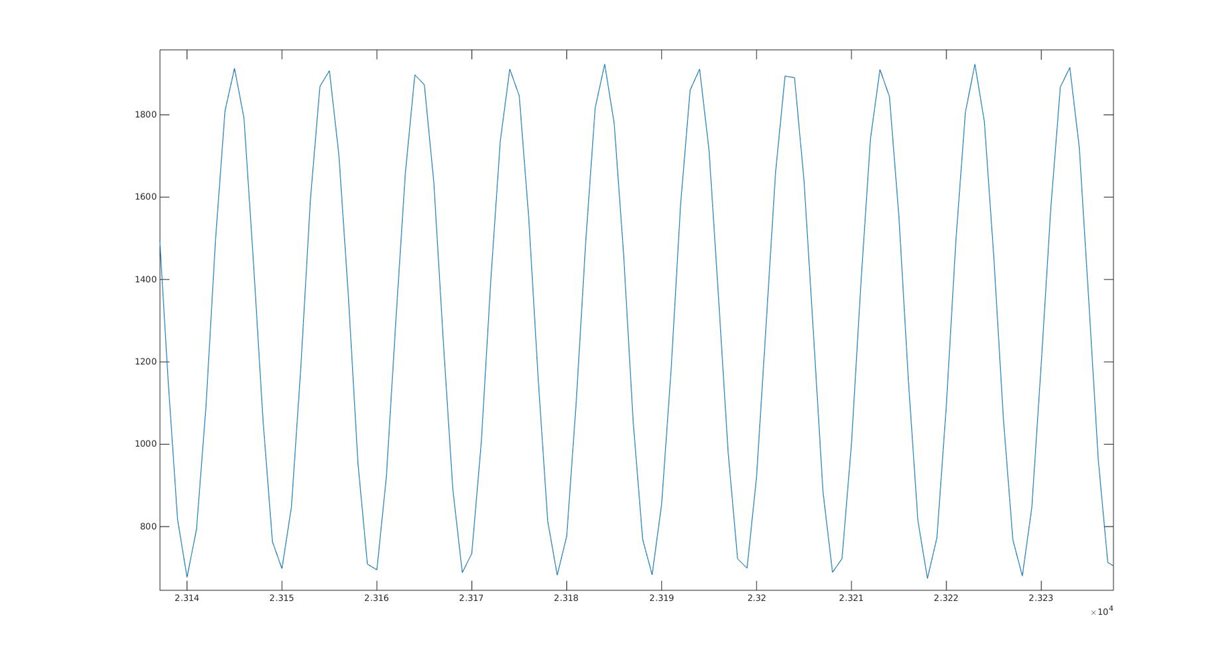Hello every one!!!
I would like to know how to achieve the 1MSPS adc coversion with my MSP432, The first thing that I do is save all the ADC data in a vector(ADC_14_BUF), after that, I transfer the data from the MSP to my computer with UART to see the resolution of the ADC.
The signal is a sinewave with 4000 Hz(in the first photo 1000Hz but in the graphics 4000 Hz), as you can se it does not look like a signal that is sampled with a speed of 1MSPS :'v, Searching some information, I found that the only way to achieve the 1MSPS ADC is using DMA, but I only found DMA examples of the MSP using the DriverLib library. DMA would be another way instead of saving the information in my ADC_14_BUF vector.
-Is DMA the only way to achieve 1MSPs, if it is, Why???
-There are DMA examples for MSP432 that dont use the DriverLib librarie???
Code:
#include "msp.h"
#include <stdint.h>
#include <stdio.h>
#include <string.h>
#define length(x) (sizeof(x)/sizeof(x[0]))
volatile short ADC_14_BUF[32488];
//volatile short BUF_8[15000];
volatile long BUF_32;
volatile short i=0,j=1;
volatile long x=0,b=0,v=0;
static short s=length(ADC_14_BUF);
int main(void)
{ WDTCTL = WDTPW+WDTHOLD; // Stop watchdog timer
/*---------------------------------------------------------------------------------------------------------*/
//Configuracion de la señal de CLK
CS->KEY = 0x695A; // Unlock CS module for register access
CS->CTL0 = 0; // Reset tuning parameters
CS->CTL0 = CS_CTL0_DCORSEL_5; // Set DCO to 48MHz (nominal, center of 8-16MHz range)
// Select ACLK = REFO, SMCLK = MCLK = DCO
CS->CTL1 = CS_CTL1_SELA_2 | CS_CTL1_SELS_3 | CS_CTL1_SELM_3;
CS->KEY = 0; // Lock CS module from unintended accesses
/*---------------------------------------------------------------------------------------------------------*/
// Configure GPIO
P5SEL1 |= BIT5; // Enable A/D channel A0-A3
P5SEL0 |= BIT5;
__enable_interrupt();
NVIC->ISER[0] = 1 << ((ADC14_IRQn) & 31);// Enable ADC interrupt in NVIC module
ADC14->CTL0 = ADC14_CTL0_ON | ADC14_CTL0_MSC | ADC14_CTL0_SHT0__4 | ADC14_CTL0_SHP | ADC14_CTL0_CONSEQ_3; // Turn on ADC14, extend sampling time
ADC14->CTL1 = ADC14_CTL1_RES_2; // Use sampling timer, 12-bit conversion results
// to avoid overflow of results
ADC14->MCTL[0] = ADC14_MCTLN_INCH_0; // ref+=AVcc, channel = A0
ADC14->IER0 = ADC14_IER0_IE0; // Enable ADC14IFG.3
SCB->SCR &= ~SCB_SCR_SLEEPONEXIT_Msk; // Wake up on exit from ISR
/*---------------------------------------------------------------------------------------------------------*/
// Configuracion de los puertos UART
P1SEL0 |= BIT2 | BIT3; // set 2-UART pin as second function
__enable_interrupt();
NVIC->ISER[0] = 1 << ((EUSCIA0_IRQn) & 31); // Enable eUSCIA0 interrupt in NVIC module
// Configuracion de UART
UCA0CTLW0 |= UCSWRST;
UCA0CTLW0 |= UCSSEL__SMCLK; // Pone eUSCI en reseteo
UCA0BR0 = 26; // 48000000/16/9600
UCA0MCTLW = 0x1000 | 0x0020 | UCOS16;
UCA0BR1 = 0;
UCA0CTLW0 &= ~UCSWRST; // Inicializa eUSCI
UCA0IE |= UCRXIE; // habilita la interrupcion USCI_A0 RX
/*---------------------------------------------------------------------------------------------------------*/
while(1)
{
ADC14->CTL0 |= ADC14_CTL0_ENC | ADC14_CTL0_SC; // Start conversion-software trigger
}
}
// ADC14 interrupt service routine
void ADC14_IRQHandler(void)
{
if (ADC14->IFGR0 & ADC14_IFGR0_IFG3)
{
ADC_14_BUF[i++] = ADC14->MEM[0];
}
// for(i=0;i<= s+1;i++){ADC_14_BUF[i] = ADC14->MEM[0];}
if(i >= s)
{
if(j <= s)
{
for(v=0;v<=4799;v++) //ESPERA
{while(!(UCA0IFG&UCTXIFG));UCA0TXBUF = 'i';}
for(j=0;j <= s-2;j=j+2) //s+1
{
BUF_32= ADC_14_BUF[j+1];
BUF_32= (BUF_32<<12)|ADC_14_BUF[j];
//ADC_14_BUF[j+1]<<12;
while(!(UCA0IFG&UCTXIFG));
// BUF_8[x]=(BUF_32 & 0x000000FF);x=x+1;
UCA0TXBUF = (BUF_32 & 0x000000FF);
while(!(UCA0IFG&UCTXIFG));
// BUF_8[x]=(BUF_32 & 0x0000FF00)>>8;x=x+1;
UCA0TXBUF = (BUF_32 & 0x0000FF00)>>8;
while(!(UCA0IFG&UCTXIFG));
// BUF_8[x]=(BUF_32 & 0x00FF0000)>>16;x=x+1;
UCA0TXBUF = (BUF_32 & 0x00FF0000)>>16;
}
j=s+10;
}
BUF_32=0x00000000;
i=s+10;
}// acanga abajo va el codigo de desplazamiento
}
/*---------------------------------------------------------------------------------------------------------*/
// Rutina de interrupcion de UART
void EUSCIA0_IRQHandler(void)
{
if (UCA0IFG & UCRXIFG)
{
// while(!(UCA0IFG&UCTXIFG));
}
}
/*---------------------------------------------------------------------------------------------------------*/




